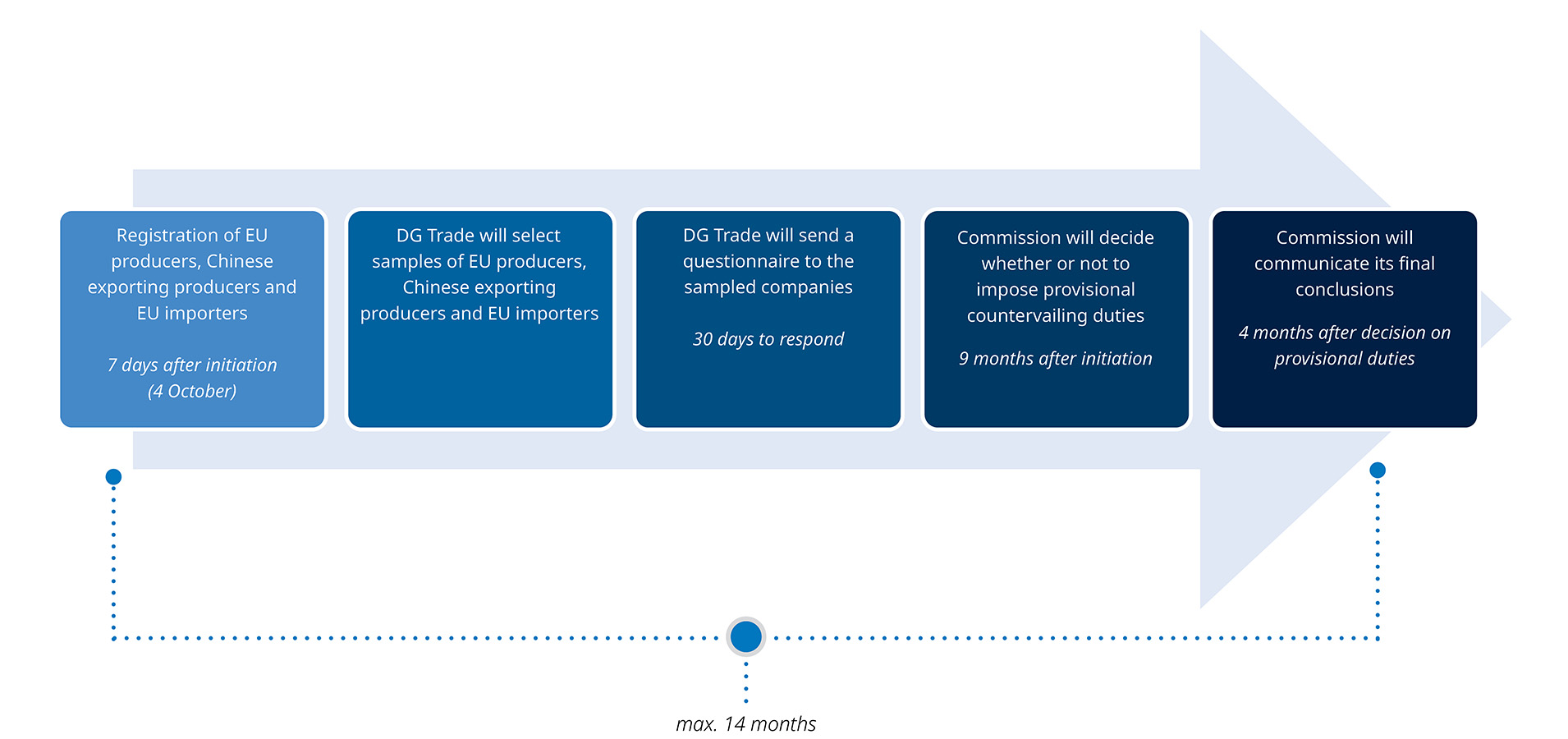
6 October 2023 • 5 minute read
EU Commission published the notice of initiation of an anti-subsidy proceeding against imports of new battery electric vehicles from China
The European Commission’s Directorate General for Trade (DG Trade) officially published the notice of initiation of an anti-subsidy investigation against imports of battery electric vehicles (EVs) designed for the transport of persons from China in the morning of 4 October 2023. The launching of the proceedings does not come as a surprise, as the President of the European Commission openly announced it at her State of the European Union speech on 13 September. Yet, the initiation of this investigation is a landmark in EU’s efforts to tackle subsidized imports from China. It comes as a first step in the materialization of the EU Commission’s assertiveness in making use of traditional tools – in this case the EU anti-subsidy Regulation – to help achieve its policy objectives relating to the EU Industrial Strategy to ensure the energy transition and to build resilient and competitive economies in strategic sectors.
The EV anti-subsidy investigation is set to be a particular and unique one. Although the official initiation of the investigation comes after several months of strong pressure from the EU industry on DG Trade, it was done on an ex officio basis – by the EU Commission’s own initiative. In addition, the investigation was launched based on threat of injury to the EU industry instead of the regular material injury grounds. In fact, in the notice of initiation the Commission emphasizes on the accelerated increase of imports of EVs from China and the fact that the prices of the product are significantly lower than those of the Union industry. But it also confers strong importance to the existence of evidence of sufficient freely disposable capacity in China, and the “imminent and substantial increase in such capacity which does not appear to be absorbable by other markets”. These conditions deviate from the Commission’s usual practice, which rarely initiates investigations on ex officio and threat of injury basis.
Moreover, the EV investigation will raise fundamental but highly technical questions regarding the definition of the product concerned. The notice of initiation indicates the product under investigation is “new battery electric vehicles, principally designed for the transport of nine or less persons, including the driver, propelled solely by one or more electric motors”, and motorcycles are excluded. However, it is expected that exclusion requests arise during the proceedings, as well as issues such as the impact of the investigation on EU consumers. The Commission will now need to work hand-in-hand with relevant interested parties willing to cooperate with the investigation to reach sound conclusions: namely EU manufacturers, EU importers, EU users, Chinese exporting producers and, of course, the Chinese government.
Now that the proceedings are officially ongoing, EU industry members and all interested parties must be aware of the following steps and act rapidly to allow their voice to be heard in the upcoming stages of the investigation:

Third interested parties have opportunities to provide comments on the legal and technical aspects in various stages of the investigation. This includes rebuttals of other parties’ comments, which allow the Commission to reach final conclusions based on the fullest possible information.
The EVs anti-subsidy investigation will also bring up a heated political discussion as the Commission’s conclusions must be approved by qualified majority by EU Member States before any anti-subsidy measure is adopted. Consensus from Member States on this issue is far from being given, so participating parties will also need to be aware and active of the political scenario surrounding the investigation. In this case in particular, in addition to opposition from exporting producers and EU importers, strong debate will take place on the impact of the measures to EU consumers (in this regard, inflation concerns will also certainly be raised) and also on possibly diverging interests and concerns of different EU car manufacturers. We should of course also not forget what is at stake here: a major trade policy in both the EU and China. Potential threats of retaliation by China cannot be ruled out.
DLA Piper has fully integrated its International Trade & Government Relations practice with its European Government Affairs practice with extensive experience on advising clients on anti-subsidy investigations by the EU Commission. This allows us to advice our clients on the technical and legal aspects of complex anti-subsidy investigations such as the newly initiated one on EV imports from China through the extensive experience of the International Trade team, while also supporting the lobbying required in tense political debates at the heart of the EU. In addition, our team regularly collaborates with colleagues from DLA Piper’s various EU offices. Our geographic coverage enables us to act effectively and rapidly in various key EU Member States to the extent necessary for legal, advocacy and lobbying actions.
Please contact our key partners in Brussels for all matters related to this investigation:


